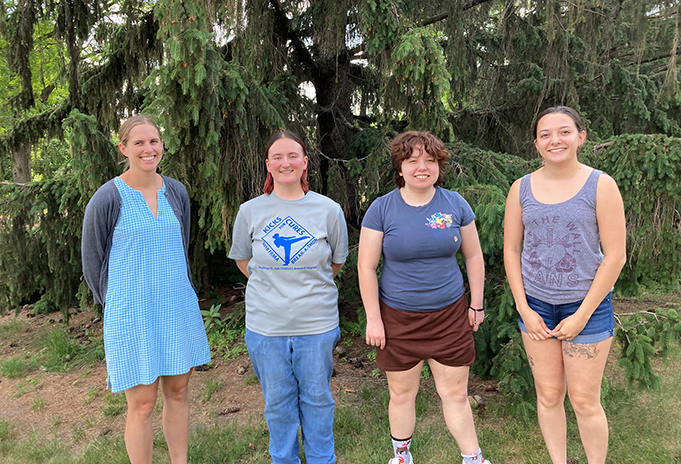
Three University of Wisconsin-River Falls students are honing their research skills this summer as part of a National Science Foundation grant to study the effect of pinenes, molecules released by conifer trees and other vegetation into the atmosphere.
The $459,686 three-year grant was received by chemistry and biotechnology Professor Stacey Stoffregen, in collaboration with Macalester College chemistry Professor Keith Kuwata.
UWRF biotechnology seniors Makayla Mobeck, of Forest Lake, Minn.; Lilianna Rolands, of Stevens Point; and senior chemistry major Trinity Olguin, of Webster, are engaged in the research project this summer.
Pinenes are oxidized by other molecules in the atmosphere and during the process produce an important molecule that acts as a detergent for the atmosphere. The NSF-funded study is titled “Research in Undergraduate Institutions: The Tropospheric Oxidation of Biogenic Hydrocarbons: Probing Temperature Dependence and Autoxidation.”
“We hope to gain an understanding of the atmospheric conditions that best promote the formation of the detergent and learn more about the impact of pinene oxidation on global warming,” Stoffregen said.
Mobeck said she wanted to gain experience in undergraduate research.
“You feel like a professional and you are getting hands-on experience outside your classes,” Mobeck said. “For me, especially because I plan to go into the workforce right after graduation, having this experience can help me get into higher levels of employment.”
It also helps her resume stand out to employers, Mobeck noted.
Rolands, who plans to go to graduate school, said having research experience is going to set her apart from other graduate school applicants.
Olguin, who is part of the McNair program that helps students who are first-generation low-income students or from historically underrepresented groups develop skills to apply for graduate school, plans to study organic chemistry in graduate school.
“I am interested in working in green chemistry,” she said. “I like the thought of chemistry done in an environmentally-friendly way.”
Stoffregen said the classroom experience and dedicated research projects are quite different for students.
“There is an aspect of research that allows students to become much more independent and to work on their troubleshooting skills,” Stoffregen said. “It broadens their understanding of chemistry and increases their flexibility as scientists working in a group and communicating their ideas. Research allows them to investigate something new.”
For students interested in furthering their education in graduate school, undergraduate research helps them determine if graduate school, where they would devote most of their time to research projects, will be a good fit, Stoffregen said.
The students are about halfway through their 10-week full-time research project with Stoffregen. They will present their research findings at the Midwest Undergraduate Computational Chemistry Consortium Conference at UW-Madison August 1-2.
Mobeck said she was thrilled to have the opportunity to be involved in an NSF-funded research project this summer.
“I like research versus being in the classroom,” she said. “I feel I can take time to learn, rather than just trying to get a good grade. When there is no pressure of a grade, you can delve deeper into what you are doing, the meaning and what you are learning.”
Olguin agreed that with a research project there is more quality time spent learning about the subject.
Both Rolands and Mobeck started at UWRF in their first year of college and then transferred to UW-Stevens Point. They returned to UWRF because of the undergraduate research opportunities.
“Here at UW-River Falls I have had a lot of opportunities to work in research,” Rolands said.
After this year, additional students will continue the research project for the next two summers. Their contributions will supplement the growing understanding of atmospheric processes, Stoffregen said.
Written by UW-River Falls
Link to original story: https://www.uwrf.edu/News/National-Science-Foundation-funded-research-project-to-study-pinene-impact-on-atmosphere.cfm